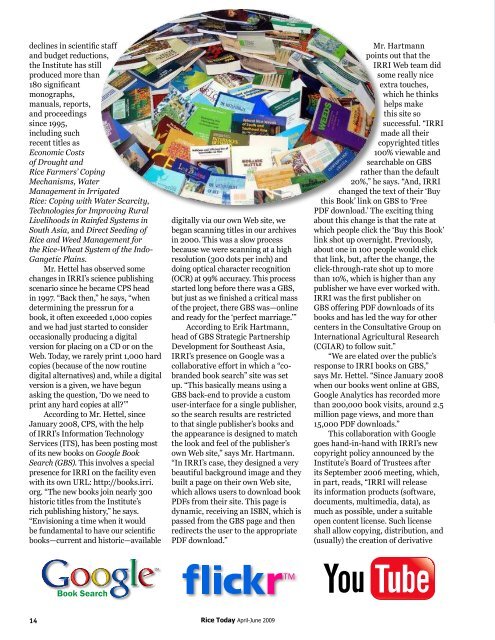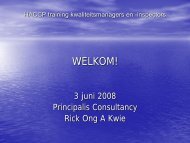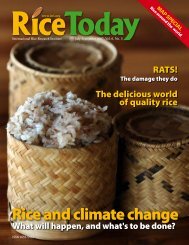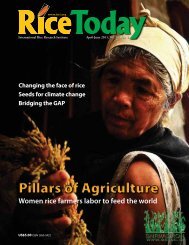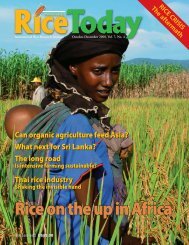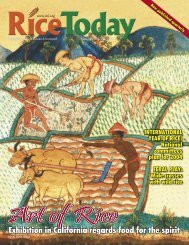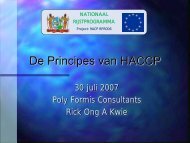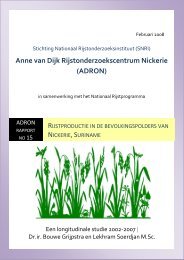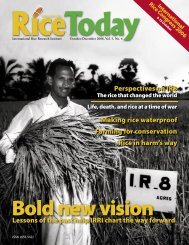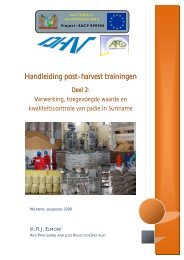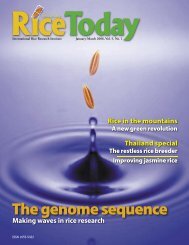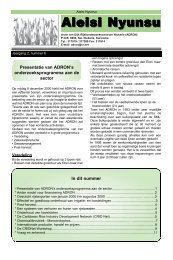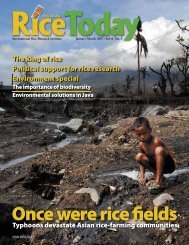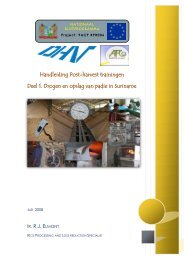"Scuba rice" - adron.sr
"Scuba rice" - adron.sr
"Scuba rice" - adron.sr
Create successful ePaper yourself
Turn your PDF publications into a flip-book with our unique Google optimized e-Paper software.
declines in scientific staffand budget reductions,the Institute has stillproduced more than180 significantmonographs,manuals, reports,and proceedingssince 1995,including suchrecent titles asEconomic Costsof Drought andRice Farmers’ CopingMechanisms, WaterManagement in IrrigatedRice: Coping with Water Scarcity,Technologies for Improving RuralLivelihoods in Rainfed Systems inSouth Asia, and Direct Seeding ofRice and Weed Management forthe Rice-Wheat System of the Indo-Gangetic Plains.Mr. Hettel has observed somechanges in IRRI’s science publishingscenario since he became CPS headin 1997. “Back then,” he says, “whendetermining the pres<strong>sr</strong>un for abook, it often exceeded 1,000 copiesand we had just started to consideroccasionally producing a digitalversion for placing on a CD or on theWeb. Today, we rarely print 1,000 hardcopies (because of the now routinedigital alternatives) and, while a digitalversion is a given, we have begunasking the question, ‘Do we need toprint any hard copies at all?’”According to Mr. Hettel, sinceJanuary 2008, CPS, with the helpof IRRI's Information TechnologyServices (ITS), has been posting mostof its new books on Google BookSearch (GBS). This involves a specialpresence for IRRI on the facility evenwith its own URL: http://books.irri.org. “The new books join nearly 300historic titles from the Institute’<strong>sr</strong>ich publishing history,” he says.“Envisioning a time when it wouldbe fundamental to have our scientificbooks—current and historic—availableBook Searchdigitally via our own Web site, webegan scanning titles in our archivesin 2000. This was a slow processbecause we were scanning at a highresolution (300 dots per inch) anddoing optical character recognition(OCR) at 99% accuracy. This processstarted long before there was a GBS,but just as we finished a critical massof the project, there GBS was—onlineand ready for the ‘perfect marriage.’”According to Erik Hartmann,head of GBS Strategic PartnershipDevelopment for Southeast Asia,IRRI’s presence on Google was acollaborative effort in which a “cobrandedbook search” site was setup. “This basically means using aGBS back-end to provide a customuser-interface for a single publisher,so the search results are restrictedto that single publisher’s books andthe appearance is designed to matchthe look and feel of the publisher’sown Web site,” says Mr. Hartmann.“In IRRI’s case, they designed a verybeautiful background image and theybuilt a page on their own Web site,which allows users to download bookPDFs from their site. This page isdynamic, receiving an ISBN, which ispassed from the GBS page and thenredirects the user to the appropriatePDF download.”Mr. Hartmannpoints out that theIRRI Web team didsome really niceextra touches,which he thinkshelps makethis site sosuccessful. “IRRImade all theircopyrighted titles100% viewable andsearchable on GBSrather than the default20%,” he says. “And, IRRIchanged the text of their ‘Buythis Book’ link on GBS to ‘FreePDF download.’ The exciting thingabout this change is that the rate atwhich people click the ‘Buy this Book’link shot up overnight. Previously,about one in 100 people would clickthat link, but, after the change, theclick-through-rate shot up to morethan 10%, which is higher than anypublisher we have ever worked with.IRRI was the first publisher onGBS offering PDF downloads of itsbooks and has led the way for othercenters in the Consultative Group onInternational Agricultural Research(CGIAR) to follow suit.”“We are elated over the public’<strong>sr</strong>esponse to IRRI books on GBS,”says Mr. Hettel. “Since January 2008when our books went online at GBS,Google Analytics has recorded morethan 200,000 book visits, around 2.5million page views, and more than15,000 PDF downloads.”This collaboration with Googlegoes hand-in-hand with IRRI’s newcopyright policy announced by theInstitute’s Board of Trustees afterits September 2006 meeting, which,in part, reads, “IRRI will releaseits information products (software,documents, multimedia, data), asmuch as possible, under a suitableopen content license. Such licenseshall allow copying, distribution, and(usually) the creation of derivativegene hettelIRRI books for Africaand AsiaWith the recent closing down of the CPS book storagefacility at IRRI headquarters, about 38,450 IRRI books(with a retail value of US$384,000) were shipped viasea freight to Africa and Asia. One shipment of 17,000 bookstopped off a container shipment of agricultural equipment toMozambique at no extra charge. These books arrived at IRRI’sEast and Southern Africa Region office in Mozambique, theAfrica Rice Center’s (WARDA) office in Nigeria, and IRRI’s 11country offices in South and Southeast Asia.They are being redistributed to needy national librariesacross these regions. New IRRI publishing policies in the digitalproducts; prohibit commercialization;and require attribution as well asthe release of derivative productsunder the same license as the originalproduct was released by IRRI, hence,some rights reserved.”This new Creative Commons(CC) policy, which covers Rice Todayas well as spelled out at the bottomof the contents page, doesn’t reallychange IRRI’s long-standing policyof always granting permission touse its information products fornoncommercial purposes. “This newpolicy simply bypasses the ‘permissionrequirement’ altogether and clarifiesand enhances the Institute’s intentionwhere sharing of information isconcerned,” says Mr. Hettel.In addition to placing books onGBS, IRRI has embraced this policyby placing this same CC statementon its Web site (http://irri.org) andfeaturing some 4,500 images on thepublic photo management facility,flickr (www.flickr.com/photos/ricephotos), and some 60 videos andcounting on YouTube (www.youtube.com/irrivideo), which compositelyhave had some 75,000 views.According to Marco van denBerg, ITS manager, the digitaldistribution of IRRI informationand photos achieved via GBS andflickr gives access to audiencesthat have been difficult to reachusing traditional methods, for avariety of reasons. “Among the top25 countries that have downloadedbooks from our co-branded GBSsite are Vietnam, Iran, Indonesia,Pakistan, Bangladesh, Sri Lanka,and Myanmar,” he says.Anyone can now obtain,repurpose, distribute, and evenmodify the content (self-servicepublishing) of IRRI publications,photos, and videos with properattribution using CC licenses.glenn gregorioage, which will require lower book pres<strong>sr</strong>uns in the future,negate the need for a book storage warehouse at headquarters.In the photo at left, Glenn Gregorio, IRRI’s rice breeder forAfrica based at the WARDA office in Nigeria, determines someof the titles to ship to West Africa in consultation with AnnaArsenal, former CPS marketing and fulfillment specialist.The photo above shows some of the books being used inone of their new homes, the IRRI-Office library at the WARDANigeria station of the International Institute for TropicalAgriculture in Ibadan. The users are trainees of IRRI and WARDAcoming from different Nigerian agricultural universities. Says Dr.Gregorio, “Friday afternoon is a special time for them becausethey attend lectures on rice breeding and biotechnology andthey get to use the library. Books on rice statistics, the RiceAlmanac, and biotechnology titles are their favorites.”However, IRRI’s CC policy haspresented the CPS staff with somenew challenges when they dealwith science publishers looking tocopublish some of IRRI’s books,most of whom still request exclusivepublication rights if not downrightcopyright assignment.According to Bill Hardy, IRRIsenior science editor and publisher,some conflicts with potentialcopublishers that are not on theCC bandwagon include the outsidepublisher’s interest in havinghard-copy commercial sales anda perpetual license. IRRI, on theother hand, has primary interestsin delivering global public goodsand providing free online accessto its communication products.“Even so,” says Dr. Hardy, “IRRI istackling these issues by drafting somecreative contractual arrangementsand compromises with some flexiblecopublishers, such as World Scientificin Singapore, with which IRRI ha<strong>sr</strong>ecently copublished Rice Genetics V,Charting New Pathways to C 4 Rice,14 Rice Today April-June 2009 Rice Today April-June 200915


